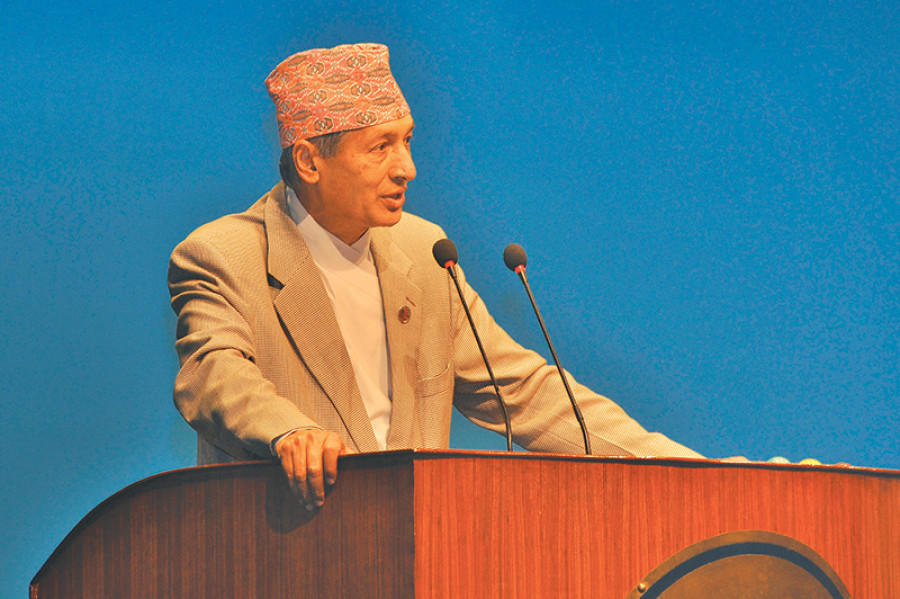Tue, Mar 3, 2026
National
Finance Minister Khatiwada says privatisation has essentially failed
The KP Oli government has taken a dim view of privatisation pursued by successive governments since 1990. In its first policy paper on economy that came out on Friday, the government said the privatisation drive of the ’90s has failed essentially.
bookmark
Published at : March 31, 2018
Updated at : April 1, 2018 07:51
Kathmandu
The KP Oli government has taken a dim view of privatisation pursued by successive governments since 1990. In its first policy paper on economy that came out on Friday, the government said the privatisation drive of the ’90s has failed essentially.
Unveiling the White Paper on Economy, Finance Minister Yubaraj Khatiwada said the privatisation process was carried out without proper assessment.
The minister was of the view that privatised enterprises were neither guided by the objectives of privatisation nor did they add value to services, products and jobs. This caused the state to incur heavy losses, Khatiwada said. “At some point, the government had almost nothing in return from the public enterprises that were handed to the private sector.”
In a marker of a major policy shift on privatisation, Khatiwada said unlike past governments, this administration would retain public enterprises in areas where the government’s presence is deemed necessary and where the state has to provide basic services to guarantee fundamental rights. Public enterprises that can compete in the market can be handed to the private sector, he said.
“We don’t have any confusion on the privatisation policy. If the government is doing business and deems it is not good, it will be handed over to the private sector,” he told journalists, after presenting the white paper.
The white paper paints a grim picture of the country’s economy as administrative cost has increased after the country adopted federalism while fiscal indiscipline left state coffers “virtually empty”.
The government’s budget balance saw a deficit of Rs200 billion this fiscal year and there is no clear source of financing development projects, the minister said. This is because the Sher Bahadur Deuba-led government failed to maintain fiscal and financial discipline, he said.
The current budget does not blend fiscal prudence with requirements of the economy. For instance, without ensuring resources, the Deuba government had approved multi-year contracts to the tune of Rs122 billion. The incumbent government has no clues on the stopgap spending bill to avert challenges.
Delay in bidding and documentation process, disbursement of budget and delegation of authority along with procedural hurdles were among his key concerns on development projects.
Although the government had targeted a treasury surplus of Rs103 billion in the last fiscal year, the cumulative budget deficit stood at Rs48.6 billion by the end of fiscal year 2016-17. Khatiwada was also critical of social security schemes introduced by the Deuba government, saying that they added to the state’s financial burden.
Amid slow capital formation with scanty gross national saving, the government has prioritised foreign capital to meet the shortfall. He seeks access to funds via government-to-government negotiation, foreign direct investment or concessional line of credit.
Commenting on the policies, former finance minister Ram Sharan Mahat said the Nepali Congress-led government had introduced privatisation based on the principle of transparency and legitimacy, which had helped reduce financial burden on the government and improve investments in social sector.
Mahat however hailed the government’s concern on reducing costs. “At the same time, the government should revise the bureaucratic structure,” he said.
The government would accord priority to inclusive and broad-based growth in partnership between the public, private and cooperative sectors to build a socialism-oriented state.
- Privatised enterprises were neither guided by the objectives of privatisation
- Public enterprises to remain in areas where the government’s presence is deemed necessary
- Critical of Deuba’s social security schemes
Most Read from National
Bus plunges into Trishuli river, 18 killed
Government declares three-day public holiday for March 5 election
Public and private vehicles banned from midnight March 4 until polling concludes
24 injured in Dhading bus accident sent to Kathmandu
Supreme Court urges bilateral Nepal-UK deal on Gurkha recruitment
Editor's Picks
Five and half decades of KP Oli in Nepali politics
How Facebook’s algorithm is amplifying one party over all others
Nepal’s IT exports near $1 billion. Can the momentum be sustained?
Parties’ lofty pledges on economy collide with hard realities
Upper house passes tourism bill with tougher Everest rules
E-PAPER | March 03, 2026
×




 9.7°C Kathmandu
9.7°C Kathmandu













